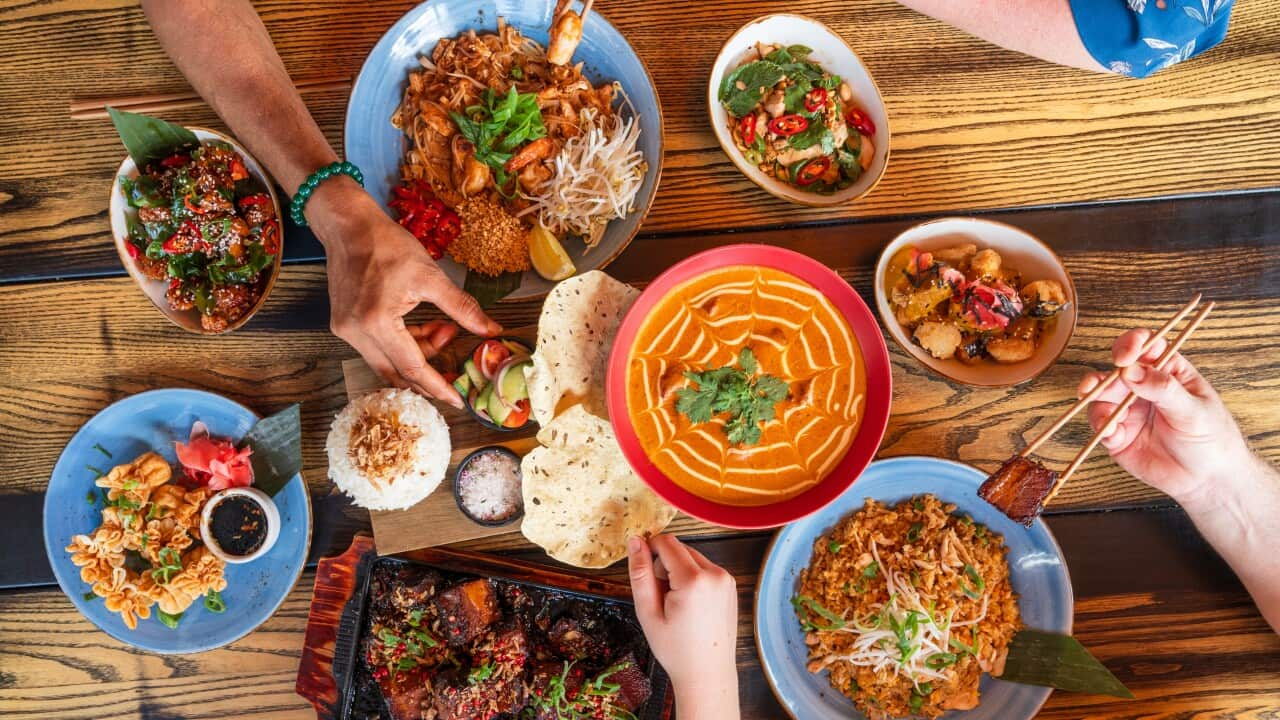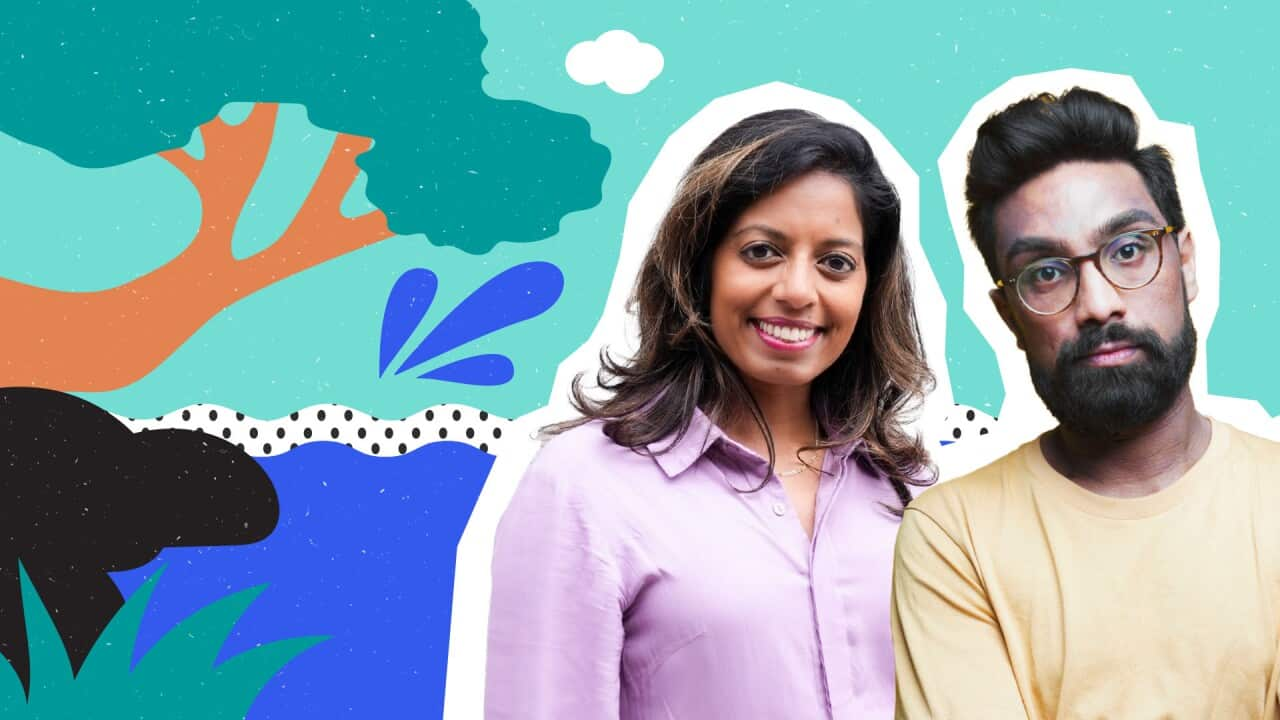Getting help when your loved one has gambling problems

Roulette table. Credit: Getty Images/Peter Cade
There is no cure when it comes to gambling addiction. But when family and friends of problem gamblers get the right support for themselves, they are more likely to help their loved ones recover. In Australia, help is available in your language.
Speaker 1
This is a SBS radio podcast, settlement guide, information, issues and stories about living in Australia.
Yumi Oba
There is no cure when it comes to gambling addiction.
Yumi Oba
But when family and friends of problem gamblers get the right support for themselves, they are more likely to help their loved ones recover.
Yumi Oba
In Australia, help is available in your language.
Yumi Oba
Data compiled in 2021 by the Australian Institute of Health and Welfare suggests that approximately one in three Australians spend money on gambling products, and 7.2 per cent of Australian adults are at risk of experiencing gambling harm.
Yumi Oba
Negative consequences from gambling come in different forms, including financial, legal and emotional harm. These don't only affect the individual, but also their family and social network. Sally Gainsbury, professor of Psychology at The University of Sydney, explains why the nature of this addiction can make it harder to address.
Sally Gainsbury
Gambling can be easily hidden both online and offline. It's often called the hidden addiction because you don't see it in someone's eyes or smell it on their breath if they have a gambling problem. Online gambling brings that to the next level by obviously being able to be physically in the home while gambling or doing it on a mobile device. So, it does appeal to different people, particularly if it's online wagering, it has a somewhat of a different audience to poker machines. The harms are still the same and the financial costs are still the same.
Yumi Oba
Gambling participation is not greater amongst people of culturally and linguistically diverse (CALD) backgrounds.
Yumi Oba
But research shows that they are more vulnerable to gambling harm and experience more gambling problems than the general community.
Yumi Oba
Natalie Wright is the director of the Office of Responsible Gambling in New South Wales. She explains how someone's culture can influence their attitude towards gambling.
Natalie Wright
So quite often shame and stigma are really big barriers for help seeking in people from culturally and linguistically diverse communities, and often that collectivist sort of culture means that the problem that they may be experiencing with gambling is not only individual, it reflects on the families. And the other issue is around counseling in many communities, a really foreign western concept. So, there's often a notion that people want to keep things within the family.
Yumi Oba
*Adam is a Western Sydney resident of Arabic background. He is in recovery from problem gambling since 2014.
Yumi Oba
His name and voice has been changed to protect his identity.
Adam
In general, in terms of Middle Eastern culture, counseling and seeking help is frowned upon regardless of addiction. I think for me, like in terms of my immediate family, they were extremely supportive of me getting help when I wanted to be helped. My extended family was, how do I say it? They looked at me as if I was as if something was wrong with me, not necessarily someone who needed help.
Yumi Oba
Professor Gainsbury is also the director of Gambling Treatment and Research Center at the University of Sydney. She says it's critical for treatment to go beyond targeting the individual problem gambler.
Sally Gainsbury
Obviously, one aspect is to work with the individual to manage their own understanding of gambling and use of gambling as a coping strategy, but also to look at the dynamics of their environment. Do they have support in terms of their recovery? Have they disclosed their gambling problem? Is their gambling problem impacting significant others? And how can we set them up for success by changing that environment?
Yumi Oba
Professor Gainsley says many people do not choose formal support options.
Sally Gainsbury
There's a lot of variation in terms of how people get support for gambling, and many people will look for informal support, so whether that be a health practitioner or you know, supports within the community such as community leaders or religious leaders or support within their family. This can be really helpful if it is appropriately provided.
Yumi Oba
Relatives of friends of people experiencing gambling problems are also impacted and need support themselves too.
Sally Gainsbur
They are often experiencing financial harm associated with gambling. They might be experiencing stress to the relationship, and they have to deal with the negative consequences. So these people need to have support for themselves in order to manage their own levels of stress or distress. They also need to support themselves regardless of whether the person is trying to change their gambling. It's also helpful for them to have support while they're trying to assist someone or support someone who is attempting to recover.
Yumi Oba
In Adam's case, a member of his family who sought counseling help, which in return was beneficial for all.
Adam
This particular family member due to my gambling, they were better able to support my requirements for recovery, which sometimes can be very difficult to understand when you're not an addict.
Adam
Well, I think the getting professional help provided them with the understanding that they're not responsible for what has happened, they're not at fault for what has happened, and they can navigate the individual that I am much easier.
Yumi Oba
Adam recalls the turning point for him in recovery process came through Gamblers Anonymous. But he says that everyone is different.
*Adam
For some people it might be as simple as getting into a routine of not going to the gambling venues and changing your life around, becoming more a part of your community as opposed to continually gambling. I've seen people succeed with just going to counseling on a weekly basis or changing jobs or changing programs of life, exercising more. There's things that work for everyone.
Yumi Oba
State-based services offer resources and counseling by phone, online or in person.
Yumi Oba
The New South Wales government campaign, The Number That Changed Our Life, is aimed at helping people from diverse communities that are facing problems with gambling and are uncertain of how to get help.
Yumi Oba
The first port of call for anybody needing help in New South Wales is Gamble Aware, says Natalie Wright.
Yumi Oba
People calling in the Gamble Aware helpline on 1800 858 858 have the option to use an interpreter and get matched with a counselor speaking their language.
Natalie Wright
So we actually provide counseling in upwards of 50 languages, so that is available for anyone in New South Wales. Family plays a really big part in supporting the person that is struggling with gambling, and our services also support their loved ones. You know, the importance of family particularly culturally and linguistically diverse communities can't be understated.
Yumi Oba
Support resources are also available via a Gamble Aware website, which is translated into several community languages. Counseling can address both emotional and financial problems affecting the immediate environment of a problem gambler.
Natalie Wright
Those that we support, about a third of our clients through Gamble Aware are actually friends and family of the gambler, and we know that it's really effective for not only supporting them but their loved one in their recovery. And the other thing to mention is that therapeutic counseling, but there is also financial counseling available if there are some debt piling up due to your loved ones gambling or you know there's the financial issues.
Yumi Oba
Ultimately, according to Professor Gainsley, the first step for loved ones of problem gamblers is realising that they are not alone and that getting support for themselves is crucial.
Professor Gainsley
It's important for people to realise that there is a lot of support available for them. They're not by themselves. This is not a unique problem they have to face for the first time. To be mindful of, you know, the adage of getting your own oxygen mask on first, to try and be supportive of someone with a gambling problem, but to encourage them to seek professional help. This is something that people have years of training to be able to do. It's not expected that as a friend or a family member, you're going to be able to provide that same level of support to help someone.
Yumi Oba
For support, call National Gambling Helpline on 1800 858 858.
Yumi Oba
National debt Helpline on 1800 007 007 or Lifeline on 1311 14.
Speaker 1
This was an SBS radio podcast. For more settlement guide stories, visit SBS.com.au/radio



